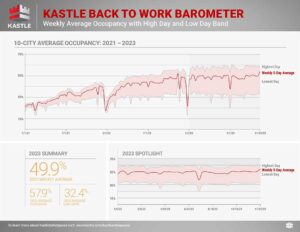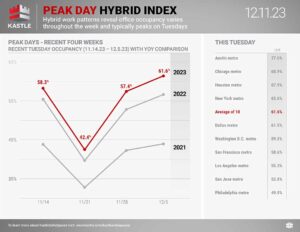Since the beginning of the pandemic, Kastle has been providing weekly reports on office occupancy to provide clarity on return-to-office trends and help businesses understand shifting workplace dynamics.
Week after week, our team studies access data from roughly 2,000 buildings and over 325,000 cardholders in the ten largest markets Kastle serves. The Kastle Barometer is published weekly, summarizing the anonymized data in each market. Charted percentages reflect unique daily user entries relative to a pre-COVID baseline, averaged weekly.
As we wrap up 2023, we offer a historical perspective on the five-day weekly average contrasted with the highest and lowest occupancy day of each week. Averages tend to blur the details of the differences in each day of the week. For most of 2023, the five-day weekly average has hovered around 50% of pre-pandemic occupancy, but the high day each week has been closer to 60% and the low day around 30%.
Over the course of the year, hybrid work patterns have set in and reveal occupancy varies throughout the week with Tuesdays typically being the highest day of the week and Fridays being the lowest.
As return-to-office rates have steadily increased, the range between the high days and the low days has also expanded, which may help explain anecdotal experiences that return-to-office rates are higher than the Barometer’s weekly average.
Starting today, we will add a new dimension to the weekly Barometer report that tracks Tuesday occupancy over time in ten cities.
The Peak Day Hybrid Index will publish each week alongside the Barometer, offering a wider aperture into the full picture of workplace occupancy. With it, we hope to provide a broader understanding of office occupancy and workplace trends – and offer clues about what the future may hold.
For more than three years, Kastle has published the Barometer to arm real estate owners and occupiers, decision makers and public sector leaders with the best data to inform critical decisions during this dynamic time. The office has weathered a few years of uncertainty and tumult. Let 2024 be the year people see the immense value of offices for their employees, for their businesses, and for America’s cities.

